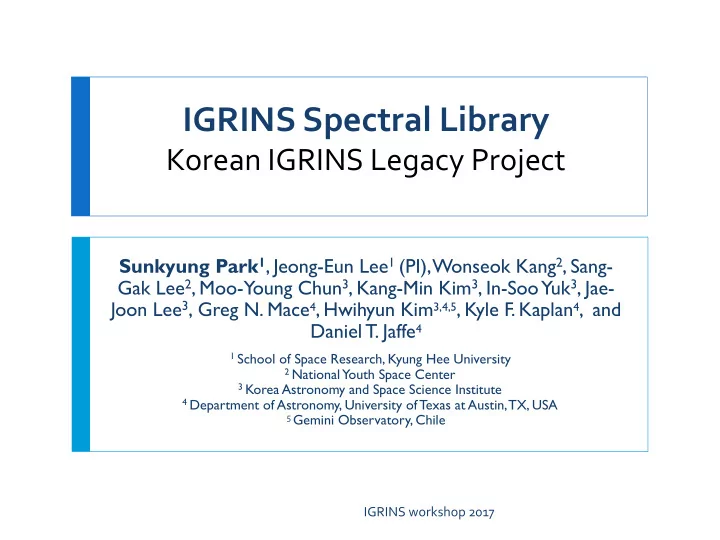

IGRINS ¡Spectral ¡Library Korean ¡IGRINS ¡Legacy ¡Project Sunkyung Park 1 , Jeong-Eun Lee 1 (PI),Wonseok Kang 2 , Sang- Gak Lee 2 , Moo-Young Chun 3 , Kang-Min Kim 3 , In-Soo Yuk 3 , Jae- Joon Lee 3 , Greg N. Mace 4 , Hwihyun Kim 3,4,5 , Kyle F. Kaplan 4 , and Daniel T. Jaffe 4 1 School of Space Research, Kyung Hee University 2 National Youth Space Center 3 Korea Astronomy and Space Science Institute 4 Department of Astronomy, University of Texas at Austin, TX, USA 5 ¡ Gemini Observatory, Chile IGRINS ¡workshop ¡2017
1. Introduction Introduction Library λ[μm] Sp.Type Lumi. ¡Class # Resolution IRTF 0.8 ¡-‑ 5 F ¡-‑ M I ¡-‑V 210 2,000 (Rayner et ¡al. ¡2009) CRIRES 0.96 ¡– 5.3 B ¡-‑ M I ¡-‑V ~ ¡30 100,000 (Lebzelter et ¡al. ¡ 2012) Rayner et al. 2009
1. Introduction IRTF IRTF ¡(R~2,000) IGRINS (R~45,000) Rayner et al. 2009
Library λ[μm] Sp.Type Lumi. ¡Class # Resolution IRTF 0.8 ¡-‑ 5 F ¡-‑ M I ¡-‑V 210 2,000 (Rayner et ¡al. ¡2009) CRIRES 0.96 ¡– 5.3 B ¡-‑ M I ¡-‑V ~ ¡30 100,000 (Lebzelter et ¡al. ¡2012) IGRINS CRIRES-‑POP
CRIRES-‑POP R~100,000 Lebzelter et al. 2012 IGRINS R~45,000
Target ¡Selection MUST } MK ¡Standard ¡star } Low ¡variability } Low ¡rotational ¡velocity } Low ¡chromospheric activity } No ¡binary ¡system Supergiants Median value : ~0.02 Bright giants Giants Sub-giants If ¡possible, Dwarfs } RA ¡distribution, ¡Sp. ¡Type ¡distribution, ¡Mag. ¡Range, ¡[Fe/H] ¡ range, ¡Benchmark ¡stars
IGRINS I mmersion ¡ GR ating IN frared S pectrograph } IGRINS ¡is ¡a ¡ high-‑resolution ¡(R ¡~ ¡45,000) ¡ near-‑infrared ¡ spectrograph ¡mounted ¡on ¡the ¡2.7 ¡m ¡Harlan ¡J. ¡Smith ¡ Telescope ¡(HJST) ¡at ¡the ¡McDonald ¡observatory. } Wavelength ¡coverage ¡: ¡ H ¡(1.49-‑1.80µm) ¡ & ¡ K ¡(1.96-‑2.46 ¡ µm) ¡ bands
3. 1. Observations Observation ¡ } Observed ¡nights ¡ : ¡ 13 ¡nights } The ¡majority ¡of ¡the ¡data ¡were ¡obtained ¡in ¡a ¡series ¡of ¡ABBA nodding ¡observations. } Some ¡targets ¡were ¡observed ¡with ¡nod-‑off-‑slit mode ¡ because ¡of ¡their ¡brightness ¡(usually ¡K ¡≤ ¡3). ¡ } Nearby ¡A0 ¡star ¡was ¡observed ¡immediately ¡after ¡or ¡before ¡ the ¡observation ¡of ¡each ¡target ¡for ¡telluric ¡correction ¡(median ¡ difference ¡of ¡airmass : ¡~0.05).
3. 2. Data Reduction Data ¡Reduction We reduced the data using } IGRINS pipeline version 2 (https://github.com/igrins/plp) with following steps; flat-fielding, sky- subtraction, spectrum extraction, and wavelength calibration. } T elluric correction is applied after scaling and shifting the A0 spectra to compensate for the difference in airmass and change in the wavelength calibration. } We divided the target spectrum by the spectrum of A0 telluric standard star to remove the telluric absorption features and the instrumental throughput.
4.1. Spectra Supergiants
4.1. Spectra Giants
4.1. Spectra Dwarfs
4.1. Spectra
4.1. Spectra
4.2. ¡Spectral ¡Index Spectral ¡Index K ¡band Center Species H band Wavelength Ca ¡I 1.978 Center Species Spectral ¡Index Al ¡I 2.110 Wavelength Al ¡I 2.117 Fe ¡I 1.534 Na ¡I 2.209 Fe ¡I 1.563 Spectral ¡features ¡which ¡have ¡relations ¡between ¡ Ti I 2.222 Mg ¡I 1.575 their ¡ EWs and ¡ stellar ¡atmospheric ¡parameters ¡ Ti I 2.224 Fe ¡I 1.580 (T eff , ¡log ¡ g , ¡and ¡[Fe/H]). Fe ¡I 2.226 Fe ¡I 1.629 Ti I 2.232 Fe ¡I 1.649 Ti I 2.245 Al ¡I 1.672 Fe ¡I 2.248 Al ¡I 1.677 Ca ¡I 2.266 Mg ¡I 1.711 Mg ¡I 2.281 CO ¡2-‑0 2.293
Spectral ¡Diagnostics –Teff Supergiants Giants Dwarfs
Application ¡to ¡YSOs ¡(HBC ¡722) } K5 star ¡convolved ¡with ¡a ¡rotational ¡velocity ¡~ ¡50 ¡km/s } Spectral ¡type ¡ à Disk ¡temperature Broad ¡absorption ¡features ¡ are ¡produced ¡by ¡a ¡Keplerian rotational ¡disk. HBC ¡722 Convolved ¡standard ¡star Standard ¡star
Application ¡to ¡YSOs ¡(Veiling) } T ¡Tauri stars ¡are ¡known ¡to ¡exhibit ¡“veiling” ¡ ¡(Vacca et ¡al. ¡2011) } accretion ¡disk ¡– additional ¡flux ¡@ ¡IR } accretion ¡shock ¡– additional ¡flux ¡@ ¡UV / optical ¡to ¡the ¡total ¡spectrum } We ¡can ¡measure ¡the ¡veiling ¡factor ¡by ¡comparing ¡line ¡ strengths ¡of ¡the ¡targets ¡with ¡those ¡of ¡photospheric templates ¡ } EW 0riginal = ¡EW obs (1+r) ¡ à EW std = ¡EW disk (1+r) } Flux std = ¡Flux disk /(1+r)
Summary } We ¡presented ¡a ¡library ¡of ¡NIR ¡spectra ¡of ¡80 ¡stars } High-‑resolution ¡(R~45,000) } High ¡signal-‑to-‑noise ¡ratio ¡(S/N~200) } Data ¡reduction ¡with ¡IGRINS ¡pipeline ¡version ¡2 } Telluric ¡Correction } Absolute ¡Flux ¡Calibration ¡– 2MASS } Measured ¡EWs ¡of ¡strong ¡and ¡isolated ¡lines } Effective ¡Temperature ¡Indicators } Applications ¡to ¡YSOs
Thank ¡you!
Recommend
More recommend